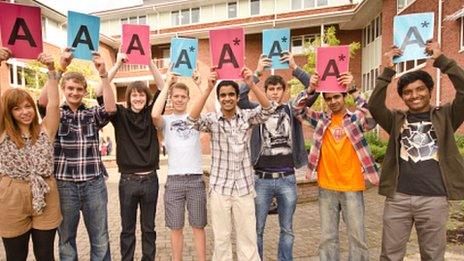A-level: Top marks in Wales fall for third year
- Published
The number of Welsh pupils receiving the highest A-level grades has fallen for a third year although those who passed has risen slightly.
The number of pupils who gained A* to E grades went up from 97.2% last year to 97.6% this year.
Results for A* and A grades are lower than the UK average, but more students passed the Welsh Baccalaureate.
Education Minister Leighton Andrews said it was "positive" to see the pass rate improving.
The total number of A-level entries in Wales this year fell by 1.9% to 37,150 - the decrease largely caused by a fall in the number of entries by boys.

These students at Yale College in Wrexham were celebrating top grades
The proportion of candidates gaining grade A* fell from 6.3% last year to 6% this year, compared to the UK average of 7.9%.
It means there is a 1.9 percentage point difference between Wales and the UK average - the same as last year.
The percentage of students gaining A* and A grades also went down, from 23.9% last year to 23.6% this year - the lowest figure since 2006.
The UK average was 26.6% (A*/A), although that figure is also lower than for 2011.
Therefore there is now a 3 percentage point difference between Wales and the UK average. Last year it was 3.1%.
However there has been an improvement in A* to C and A* to B grades - although Wales still lags behind the UK on both measures.
Last year, there was also a rise in the overall pass rate for Welsh students, but the number achieving A* and A was below the UK average.
The Welsh government said that was because Welsh Baccalaureate results were not included in the figures.
This year, a total of 8,259 candidates were awarded the Advanced Diploma, compared with 6,948 in 2011, representing an increase of almost 20% over the number successful last year.
Mr Andrews, who joined pupils at Caerleon Comprehensive School in Newport as they picked up their results, said the percentage of pupils achieving top grades in England had also fallen.
"We have to remember that in England of course there's a much higher proportion of young people who are educated in expensive, fee-paying schools. We don't have that in Wales," he said.
"These are very good results. We have got an increase in numbers who will be able to qualify for university, supported of course by the fact that the Welsh government will be paying the cost of the higher tuition fees."
Clearing process
Pupils who go on to university will be the first to be charged higher fees - some as high as £9,000 per year for their course.
However, Welsh students will not have to pay more than the previous fee of around £3,500 a year - with the shortfall being met by the Welsh government, wherever they choose to study in the UK.
Mr Andrews said that the Welsh government was confident it could afford to meet the higher fees "all the way through to the next assembly election".
Applications to all Welsh universities were down compared to last year and all the institutions were expected to have places available for pupils going through the clearing process.
University of Wales Newport said it may have double the number of places available compared to last year, while Aberystwyth University said it will be part of the clearing process for the first time in three years.
- Published16 August 2012
- Published15 August 2012
- Published16 August 2012
- Published16 August 2012
- Published10 August 2012
- Published10 July 2012
- Published19 August 2011
- Published19 August 2011
- Published18 August 2011